Like every economic activity, higher education is also in flux in the time of the coronavirus.
So much of what we do in higher education has always been about people in the real world. If we looked at it from the students' perspective, college is about people way more than it is about learning.
It has always been that way.
Where there are people, there are problems. When colleges have thousands of people, well, COVID-19 presents a nightmare to decision-makers on when and how to reopen college.
In the BC (Before Coronavirus) era, I have complained a lot about higher education here in the US. I mean, a lot. COVID-19 has merely amplified many of those problems.
Of the many complaints that I have, most of them come back to a fundamental issue of mission drift. The mission drift that places athletics above academics, for instance. The mission drift that promotes building fancy dorms and recreation facilities. It is an endless list of malpractice that results from mission drift. The mission drift is also a big reason why higher education has become terribly expensive.
In
this post in 2011, I wrote:
Such a higher educational system cannot go on forever. As Herbert Stein famously remarked, "if something cannot go on forever, it will stop." I suspect that it will come to a crashing halt when students, and their families, and taxpayers begin to see the numbers flashing by really fast on their meters.
That post became a newspaper commentary a few days after that. I didn't earn any new friends for writing that commentary ;)
I can only hope against hope that the coronavirus will compel us to rethink about our mission and to focus on it.
The following is a lightly edited post from April 27, 2011.
********************************************************
If only we were all aware of the cost of higher education and engaged in those discussions, as much as we are painfully in sync with gas prices!
Every once in a while, I point out to students that in the academic quarter system, it costs about $110 every week, per term, for each of the four-credit classes that I teach. A majority is paid for by students through tuition and fees. Taxpayers chip in which a significant amount as well.
Such an expensive investment is guided by a belief that college education is about employment and economic productivity. But, this is not entirely true. In fact, this linkage of higher education to economic performance is relatively new in human history.
Education, for the longest time, was not about credentialing for the trades. As one looks back to the days of “gurukula” in India, or Plato’s “academy” it becomes clear that education was simply about knowing. Preparations for the trades and professions happened elsewhere.
Thus, higher education wasn’t an “industry” either. Galileo pursued research on the cosmos because of his undying, and heretical, curiosity, and not because he treated that as a convenient opportunity to charge students fees that they could not afford.
But, especially since the post-World War years, there has been a transformation that has resulted in a twisted understanding that higher education is some sort of a credentialing service for young adults interested in joining the 21st century equivalents of trade guilds.
The irony is that it does not require an undergraduate degree to complete the tasks in every service sector job either. Yet, we have managed to convince ourselves that a college diploma is a must-have for mere survival, let alone prosperity. Most students I talk to feel that they have no choice but to get a college diploma, if they want to get any job anymore. And this is a horrible Hobson's choice they face.
After spending $110 week after week for classes like mine, students graduate, typically, with about $20,000 in debt only to realize the realities of employment. Despite all my full disclosures in the classroom, they are shocked to find out that there isn’t really any job waiting for them, and that the diploma is not necessarily the guaranteed route across the (un)employment gates. Further, trade guilds, often, add, and require, their own training and certification.
At the end of the day, the only beneficiaries are colleges and universities that are, naturally, recording enrollment increases. Even in my classes in the summer! This enrollment growth then triggers the need for additional facilities, which necessitates a demand for more money from students and taxpayers.
Such a higher educational system cannot go on forever. As Herbert Stein famously remarked, "if something cannot go on forever, it will stop." I suspect that it will come to a crashing halt when students, and their families, and taxpayers begin to see the numbers flashing by really fast on their meters. Maybe students and taxpayers will then demand a refund of the money they spent on my classes, eh!









